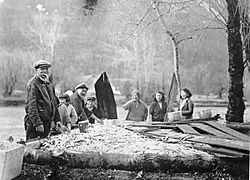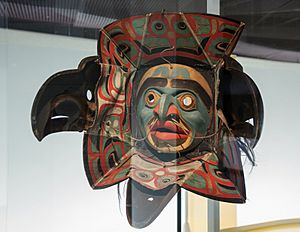Nuxalk facts for kids

Nuxálk people gathered around an eulachon stink box near the Bella Coola River.
|
|
| Regions with significant populations | |
|---|---|
| Bella Coola, British Columbia | |
| Languages | |
| English, Nuxalk | |
| Religion | |
| American Indian panentheism, Christianity, other | |
| Related ethnic groups | |
| other Coast Salish peoples |
The Nuxalk people are an Indigenous group, also known as the Bella Coola. They live on the Pacific Northwest Coast of what is now British Columbia, Canada. Their main home is around Bella Coola, British Columbia. The Nuxalk language is called Nuxalk. The Nuxalk Nation is their official government.
Contents
Understanding the Nuxalk Name and Groups
The name "Bella Coola" is often used in books and studies. However, the Nuxalk people do not prefer this name. It comes from a word used by their neighbours, the Heiltsuk people. This word, bḷ́xʷlá, means "stranger."
Within the Nuxalk language, the people call themselves "Nuxalkmc." Their language is called "ItNuxalkmc." These terms are now becoming more common in English, especially in their local area.
Ancestral Villages and Family Ties
Today, the Nuxalk people are known as Nuxalkmc. They come from many old villages across their traditional lands. For example:
- People from Kimsquit (called Sutslhm) are the Sutslhmc.
- From the Dean River come the Nutl'lmc.
- From South Bentinck Arm (Ats'aaxlh) come the Talyumc of Tallheo.
- From Kw'alhna/Kwatna, Kwatna Inlet, come the Kwalhnmc.
- From King Island (Ista) come the Istamc.
- From the Bella Coola River (Nuxalk) come the Nuxalk-mc.
These groups lived in about twenty-five Nuxalk villages. These villages stretched all the way up the Atnarko and Talchako rivers.
Coming Together in Bella Coola Valley
Over time, these different Nuxalk groups moved to their current home. This area is the Bella Coola Valley, also known as Nuxalk. This move happened through talks with Chief Pootlass and pressure from the government. They settled together because they shared similar cultures and languages. Many marriages also helped them blend into one community.
Since they all now live in the Nuxalk area of the lower Bella Coola river, they took the name Nuxalkmc. Their language also became known as ItNuxalkmc. Not everyone settled in the valley. So, the Nuxalk share many family connections with their neighbours. This includes the Heiltsuk and the Ulkatchotʼen peoples.
Nuxalk History and Culture
Before Europeans arrived, the Nuxalk population was much larger. Oral stories and studies suggest there were about 35,000 Nuxalk people. However, a smallpox outbreak in 1862 greatly reduced their numbers. By 1864, only about 300 Nuxalk people had survived.
The Nuxalk people were spread out across their lands. Some moved on their own to survive. Others were forced to move by the Department of Indian Affairs. They formed a settlement in what is now the Bella Coola Valley. The main reserve is a short distance upriver from the town of Bella Coola.
Strong Traditions and Beliefs
The Nuxalk people still have strong knowledge of their family history. This includes which villages their families came from. They also remember their family crests, songs, and dances. These traditions tell stories of their history and myths in smayustas.
Nuxalk spiritual beliefs include a creator or father God, called Alhkw'ntam. They also believe in his son, Manaakays. There is also a goddess in Nuxalk beliefs named Qamayts. Nuxalk society is very close-knit and continues to follow its traditional beliefs.
Protecting Their Land and Rights
The Nuxalk people, through their government, protect their rights to their traditional territory. They work hard to keep their traditional ways of governing themselves. This is based on their long and rich cultural history. They have always used and lived on these lands.
The Nuxalk Nation has always stood up for its rights and duties. They have never given up, sold, or lost their traditional lands. This includes through war or treaties. The Nuxalk remain strongly against signing any treaty process.
Current Population Estimates
Today, the Canadian government estimates the Nuxalk population is about 1,400 people. Nearly 900 of them live on the Nuxalk reserve in Bella Coola. However, the traditional Nuxalk government believes the true population is closer to 3,000. This number includes people of Nuxalk background who may not be officially registered with the Nuxalk Nation.
See also
In Spanish: Nuxálk para niños
 | Isaac Myers |
 | D. Hamilton Jackson |
 | A. Philip Randolph |


